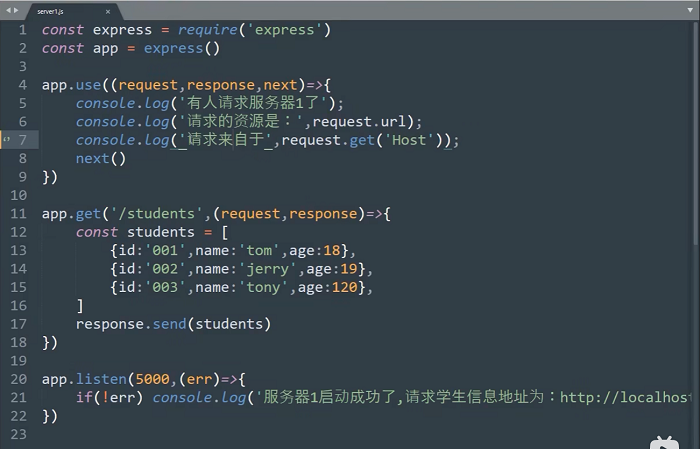vue脚手架配置代理
方法一
在vue.config.js中添加如下配置:
devServer:{
proxy:"http://localhost:5000"
}说明:
- 优点:配置简单,请求资源时直接发给前端(8080)即可。
- 缺点:不能配置多个代理,不能灵活的控制请求是否走代理。
- 工作方式:若按照上述配置代理,当请求了前端不存在的资源时,那么该请求会转发给服务器 (优先匹配前端资源)
方法二
Vue2 配置参考:
https://cli.vuejs.org/zh/config/#devserver-proxy
编写vue.config.js配置具体代理规则:
module.exports = {
devServer: {
proxy: {
'/api1': {// 匹配所有以 '/api1'开头的请求路径
target: 'http://localhost:5000',// 代理目标的基础路径
changeOrigin: true,
pathRewrite: {'^/api1': ''}
},
'/api2': {// 匹配所有以 '/api2'开头的请求路径
target: 'http://localhost:5001',// 代理目标的基础路径
changeOrigin: true,
pathRewrite: {'^/api2': ''}
}
}
}
}
/*
changeOrigin设置为true时,服务器收到的请求头中的host为:localhost:5000
changeOrigin设置为false时,服务器收到的请求头中的host为:localhost:8080
changeOrigin默认值为true
*/说明:
- 优点:可以配置多个代理,且可以灵活的控制请求是否走代理。
- 缺点:配置略微繁琐,请求资源时必须加前缀。
笔记
如果大家不想用我下面源码提供的网址返回的内容,而是想跟着视频内容用到的两个文件,我根据视频内容(视频位置13:23),写了server1.js。
server1.js

我写到这里:
// server1.js
const express = require('express')
const app = express()
app.use((request, response, next) => {
console.log('有人请求服务器1了');
console.log('请求的资源是:', request.url);
console.log('请求来自于', request.get('Host'));
next()
})
app.get('/students', (request, response) => {
const students = [
{ id: '001', name: 'tom', age: 18 },
{ id: '002', name: 'jerry', age: 19 },
{ id: '003', name: 'tony', age: 120 }
]
response.send(students)
})
app.listen(5000, (err) => {
if (!err) console.log('服务器1启动成功了,请求学生信息地址为:http://localhost:5000/students')
})启动server1:
node server1重要源码
vue.config.js
//如何使用,参考官网 https://cli.vuejs.org/zh/config/
//该文件最终输送给 webpack(基于 Node.js, 而Node.js采用的是 CommonJS)
const { defineConfig } = require('@vue/cli-service')
//暴露方式: CommonJS
module.exports = defineConfig({
transpileDependencies: true,
pages:{
index:{
//入口
entry:'src/main.js',
},
},
lintOnSave:false, //关闭语法检查
//开启代理服务器
//方式1:
/*devServer:{
//proxy: 'http://localhost:5000'
//注意:只能配置一个代理
proxy: 'https://asciim.cn/'
}*/
//方式2: 官网
devServer:{
//注意:每次修改完本文件,都需要退出,重新启动 npm run serve
proxy: {
//请求前缀作用: 如果请求的前缀有 /softool ,则走代理。 没有该前缀,就不走代理(访问实际请求url)
'/softool' :{
target: 'https://asciim.cn/m/json/000_test_proxy_server/',
pathRewrite:{'^/softool':''}, //将 /softool 字符串替换为 空
//ws:true, //用于支持 websocket通讯方式 默认为true
//用于控制请求头中的 host值
changeOrigin:true //表示代理服务器 告诉 target服务器,我来自哪里(host字段). false-不说谎 true-说谎模式 默认为true
},
//配置多个代理
'/atguigu' :{
target: 'https://asciim.cn/m/json/000_test_proxy_server/',
pathRewrite:{'^/atguigu':''},
//ws:true,
//changeOrigin:true
},
}
}
})App.vue
<template>
<div>
<button @click="getStudents">获取学生信息</button>
<button @click="getCars">获取汽车信息</button>
</div>
</template>
<script>
//引入 axios
import axios from 'axios'
export default {
name:'App',
methods:{
getStudents(){
axios.get('http://localhost:8080/softool/students.json').then( //给2个回调:成功回调+失败回调
response => { //如果成功了,就输出
console.log('请求成功了',response.data)
},
error => {
console.log('请求失败了',error.message)
}
)
},
getCars(){
axios.get('http://localhost:8080/atguigu/cars.json').then( //给2个回调:成功回调+失败回调
response => { //如果成功了,就输出
console.log('请求成功了',response.data)
},
error => {
console.log('请求失败了',error.message)
}
)
}
}
}
</script>